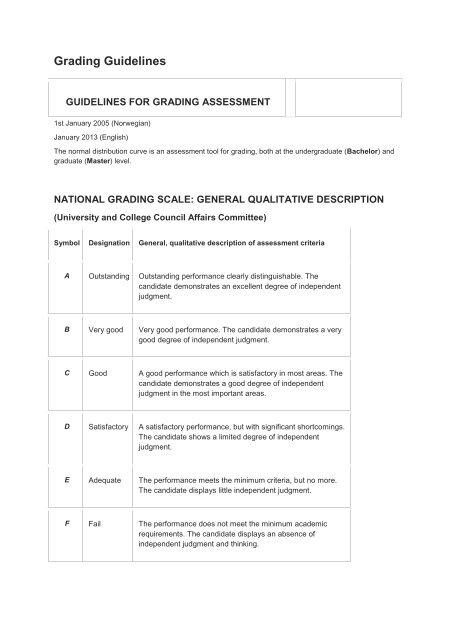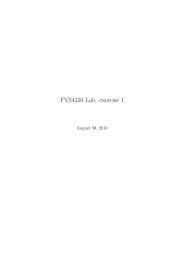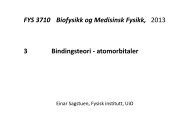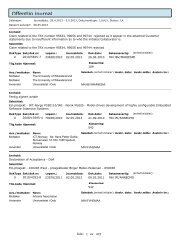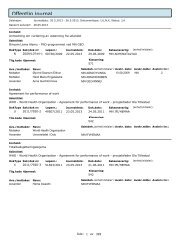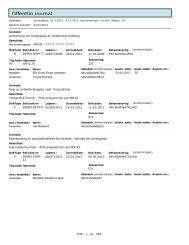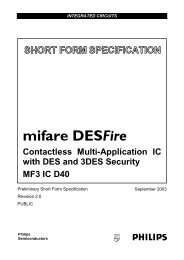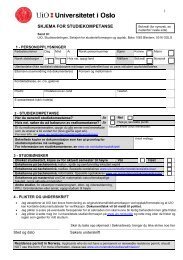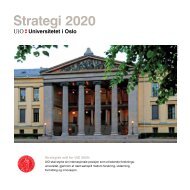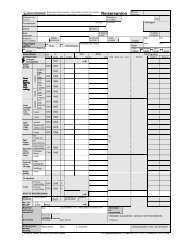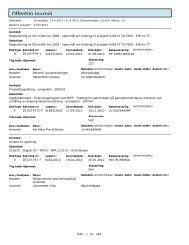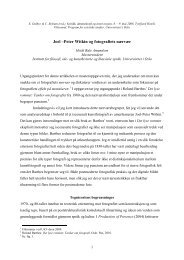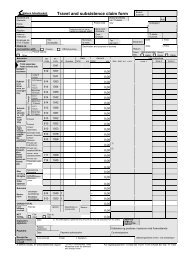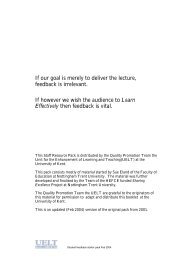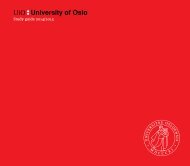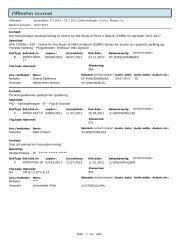Grading Guidelines
Grading Guidelines
Grading Guidelines
You also want an ePaper? Increase the reach of your titles
YUMPU automatically turns print PDFs into web optimized ePapers that Google loves.
<strong>Grading</strong> <strong>Guidelines</strong><br />
GUIDELINES FOR GRADING ASSESSMENT<br />
1st January 2005 (Norwegian)<br />
January 2013 (English)<br />
The normal distribution curve is an assessment tool for grading, both at the undergraduate (Bachelor) and<br />
graduate (Master) level.<br />
NATIONAL GRADING SCALE: GENERAL QUALITATIVE DESCRIPTION<br />
(University and College Council Affairs Committee)<br />
Symbol Designation General, qualitative description of assessment criteria<br />
A Outstanding Outstanding performance clearly distinguishable. The<br />
candidate demonstrates an excellent degree of independent<br />
judgment.<br />
B Very good Very good performance. The candidate demonstrates a very<br />
good degree of independent judgment.<br />
C Good A good performance which is satisfactory in most areas. The<br />
candidate demonstrates a good degree of independent<br />
judgment in the most important areas.<br />
D Satisfactory A satisfactory performance, but with significant shortcomings.<br />
The candidate shows a limited degree of independent<br />
judgment.<br />
E Adequate The performance meets the minimum criteria, but no more.<br />
The candidate displays little independent judgment.<br />
F Fail The performance does not meet the minimum academic<br />
requirements. The candidate displays an absence of<br />
independent judgment and thinking.
SUBJECT-SPECIFIC EVALUATION CRITERIA: UNDERGRADUATE<br />
(Bachelor-level)<br />
Symbol Designation General,<br />
qualitative<br />
description of<br />
assessment<br />
criteria<br />
Subjectspecific<br />
description of<br />
evaluation<br />
criteria*<br />
ECTSdistribution<br />
Frame values<br />
quantitive<br />
distribution<br />
A Outstanding High level of<br />
knowledge.<br />
Unusually strong<br />
analytical ability<br />
and independent<br />
use of knowledge.<br />
Empirically<br />
and<br />
theoretically<br />
precise.<br />
Clever,<br />
pointed and<br />
original<br />
discussion.<br />
High level<br />
thematic<br />
breadth of<br />
knowledge.<br />
Especially<br />
strong<br />
comparative<br />
competence.<br />
10 % 8-12%<br />
B Very good Very good<br />
overview of the<br />
field of knowledge.<br />
Good analytical<br />
ability and<br />
independent use<br />
of knowledge.<br />
Empirically<br />
and<br />
theoretically<br />
solid. High<br />
level thematic<br />
breadth of<br />
knowledge.<br />
Very good<br />
comparative<br />
competence.<br />
25% 20-30%<br />
C Good Good overview of<br />
the key elements<br />
in the field.<br />
Occasional<br />
independent use<br />
of knowledge.<br />
Empirically<br />
and/or<br />
theoretically<br />
competent.<br />
Reasonable<br />
thematic<br />
breadth of<br />
knowledge.<br />
Good<br />
comparative<br />
30% 24-36%
skills.<br />
D Satisfactory Overview of the<br />
key elements of<br />
knowledge<br />
missing. Little<br />
academic<br />
independence.<br />
Empirically<br />
and/or<br />
theoretically<br />
uneven. Some<br />
thematic<br />
breadth of<br />
knowledge<br />
and<br />
comparative<br />
competence.<br />
25% 20-30%<br />
E Adequate Meets the<br />
minimum<br />
requirements, but<br />
no more. Cannot<br />
use knowledge<br />
independently.<br />
Empirically<br />
and/or<br />
theoretically<br />
unconvincing.<br />
Thematically<br />
uncertain.<br />
Little<br />
comparative<br />
competence.<br />
10% 8-12%<br />
F Fail Lacking both<br />
detailed<br />
knowledge and<br />
overview.<br />
Very little<br />
empirical and<br />
theoretical<br />
understanding.<br />
Thematically<br />
very weak. No<br />
comparative<br />
competence.<br />
0% 0%<br />
*Note: The term "thematic" is selected as a generic term for (e.g.) - "general" knowledge of regional<br />
ethnography or intellectual history, or more specifically the subject’s central themes (gender relations,<br />
human ecology, ritual life, multiculturalism etc. – whichever are most relevant for the assessment). If the<br />
student scores unevenly in regards to the various criteria, the grade will be determined by the average.<br />
SUBJECT-SPECIFIC EVALUATION CRITERIA: SPECIAL TOPICS<br />
(COURSES) AT HIGHER LEVEL (Master-level)<br />
Symbol Designation General,<br />
qualitative<br />
description of<br />
assessment<br />
Subject-specific<br />
description of<br />
evaluation criteria*<br />
ECTSdistribution<br />
Frame<br />
values<br />
quantitive<br />
distribution
criteria<br />
A<br />
Outstanding<br />
High level of<br />
knowledge.<br />
Unusually strong<br />
analytical ability<br />
and independent<br />
use of knowledge.<br />
Empirically and<br />
theoretically precise.<br />
Clever, pointed and<br />
original discussion.<br />
High level thematic<br />
breadth of knowledge.<br />
Especially strong<br />
comparative<br />
competence.<br />
10% 8-12%<br />
B<br />
Very good<br />
Very good<br />
overview of the<br />
field of knowledge.<br />
Good analytical<br />
ability and<br />
independent use<br />
of knowledge.<br />
Empirically and<br />
theoretically solid.<br />
High level thematic<br />
breadth of knowledge.<br />
Very good<br />
comparative<br />
competence.<br />
25% 20-30%<br />
C<br />
Good<br />
Good overview of<br />
the key elements<br />
in the field.<br />
Occasional<br />
independent use<br />
of knowledge.<br />
Empirically and/or<br />
theoretically<br />
competent.<br />
Reasonable thematic<br />
breadth of knowledge.<br />
Good comparative<br />
skills.<br />
30% 24-36%<br />
D<br />
Satisfactory<br />
Overview of the<br />
key elements of<br />
knowledge<br />
missing. Little<br />
academic<br />
independence.<br />
Empirically and/or<br />
theoretically uneven.<br />
Some thematic<br />
breadth of knowledge<br />
and comparative<br />
competence.<br />
25% 20-30%<br />
E<br />
Adequate<br />
Meets the<br />
minimum<br />
requirements, but<br />
no more. Cannot<br />
use knowledge<br />
independently.<br />
Empirically and/or<br />
theoretically<br />
unconvincing.<br />
Thematically<br />
uncertain. Little<br />
comparative<br />
competence.<br />
10% 8-12%<br />
F<br />
Fail<br />
Lacking both<br />
detailed<br />
knowledge and<br />
Very little empirical<br />
and theoretical<br />
understanding.<br />
0% 0%
overview.<br />
Thematically very<br />
weak. No comparative<br />
competence.<br />
*Note: The term "thematic" is selected as a generic term for (e.g.) - "general" knowledge of regional<br />
ethnography or intellectual history, or more specifically the subject’s central themes (gender relations,<br />
human ecology, ritual life, multiculturalism etc. – whichever are most relevant for the assessment). If the<br />
student scores unevenly in regards to the various criteria, the grade will be determined by the average.<br />
SUBJECT-SPECIFIC EVALUATION CRITERIA: MASTER ASSIGNMENT<br />
Symbol Designation General,<br />
qualitative<br />
description of<br />
assessment<br />
criteria<br />
Subjectspecific<br />
description of<br />
evaluation<br />
criteria*<br />
ECTSdistribution<br />
Frame<br />
values<br />
quantitive<br />
distribution<br />
A Outstanding High level of<br />
knowledge.<br />
Unusually<br />
strong<br />
analytical<br />
ability and<br />
independent<br />
use of<br />
knowledge.<br />
B Very good Very good<br />
overview of<br />
the field of<br />
knowledge.<br />
Good<br />
analytical<br />
ability and<br />
independent<br />
use of<br />
Empirically<br />
and<br />
theoretically<br />
precise.<br />
Clever,<br />
pointed and<br />
original<br />
discussion.<br />
High level<br />
thematic<br />
breadth of<br />
knowledge.<br />
Especially<br />
strong<br />
comparative<br />
competence.<br />
Empirical<br />
material of<br />
very high<br />
quality, which<br />
is theoretically<br />
very well<br />
integrated.<br />
Empirically<br />
and<br />
theoretically<br />
solid. High<br />
level thematic<br />
breadth of<br />
knowledge.<br />
Empirical<br />
material of<br />
10% 8-12%<br />
25% 20-30%
knowledge.<br />
C Good Good<br />
overview of<br />
the key<br />
elements in<br />
the field.<br />
Occasional<br />
independent<br />
use of<br />
knowledge.<br />
D Satisfactory Overview of<br />
the key<br />
elements of<br />
knowledge<br />
missing. Little<br />
academic<br />
independence.<br />
E Adequate Meets the<br />
minimum<br />
requirements,<br />
but no more.<br />
high quality<br />
that is<br />
theoretically<br />
well<br />
integrated.<br />
Pointed and<br />
insightful<br />
discussion.<br />
Empirically<br />
and/or<br />
theoretically<br />
competent.<br />
Reasonable<br />
thematic<br />
breadth of<br />
knowledge.<br />
Good<br />
comparative<br />
skills.<br />
Empirical<br />
material of<br />
average<br />
quality<br />
discussed on<br />
an acceptable<br />
theoretical<br />
level.<br />
Empirically<br />
and/or<br />
theoretically<br />
uneven. Some<br />
thematic<br />
breadth of<br />
knowledge<br />
and<br />
comparative<br />
competence.<br />
Empirical<br />
material of<br />
uncertain<br />
quality.<br />
Cannot carry<br />
out a<br />
systematic<br />
theoretical<br />
discussion.<br />
Empirically<br />
and/or<br />
theoretically<br />
unconvincing.<br />
30% 24-36%<br />
25% 20-30%<br />
10% 8-12%
Cannot use<br />
knowledge<br />
independently.<br />
F Fail Lacking both<br />
detailed<br />
knowledge<br />
and overview.<br />
Thematically<br />
uncertain.<br />
Little<br />
comparative<br />
competence.<br />
Weak<br />
empirical<br />
material. Lack<br />
of theoretical<br />
discussion.<br />
Very little<br />
empirical and<br />
theoretical<br />
understanding.<br />
Thematically<br />
very weak. No<br />
comparative<br />
competence.<br />
Major<br />
deficiencies in<br />
the empirical<br />
material.<br />
Failed to<br />
conduct a<br />
theoretical<br />
discussion.<br />
0% 0%<br />
*Note: The term "thematic" is selected as a generic term for (e.g.) - "general" knowledge of regional<br />
ethnography or intellectual history, or more specifically the subject’s central themes (gender relations,<br />
human ecology, ritual life, multiculturalism etc. – whichever are most relevant for the assessment). If the<br />
student scores unevenly in regards to the various criteria, the grade will be determined by the average.<br />
SUBJECT-SPECIFIC EVALUATION CRITERIA OF GRADING SCALE<br />
PASS/FAIL: UNDERGRADUATE (Bachelor-level) AND GRADUATE<br />
(Master-level)<br />
At the final evaluation (final grade<br />
of final part-grade in a course):<br />
Passed<br />
Equivalent criteria<br />
for grades A-D<br />
During "progress evaluation" –<br />
preliminary tests/assignments during<br />
the term – (where the grade or partialgrade<br />
is not the final grade for the<br />
course):<br />
Failed<br />
Equivalent criteria<br />
for grades E-F<br />
Passed<br />
Equivalent criteria for<br />
grades A-D<br />
Failed<br />
Equivalent criteria for<br />
grades E-F


